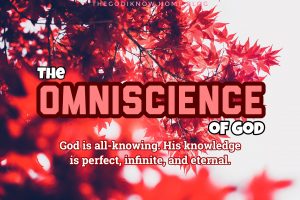
Shownotes
Welcome to Day 1524 of our Wisdom-Trek, and thank you for joining me.
This is Guthrie Chamberlain, Your Guide to Wisdom
Bible Study – By Design You Are Not Omniscient – Meditation Monday
Wisdom - the final frontier to true knowledge. Welcome to Wisdom-Trek where our mission is to create a legacy of wisdom, to seek out discernment and insights, and to boldly grow where few have chosen to grow before.
Hello, my friend, I am Guthrie Chamberlain, your captain on our journey to increase wisdom and create a living legacy. Thank you for joining us today as we explore wisdom on our 2nd millennium of podcasts. This is Day 1524 of our trek, and it is time for Meditation Monday. Taking time to relax, refocus, and reprioritize our lives is crucial in order to create a living legacy.
For you, it may just be time alone for quiet reflection. You may utilize structured meditation practices. In my life, meditation includes reading and reflecting on God’s Word and in prayer. It is a time to renew my mind, refocus on what is most important, and make sure that I am nurturing my soul, mind, and body. As you come along with me on our trek each Meditation Monday, it is my hope and prayer that you, too, will experience a time for reflection and renewing of your mind.
We are continuing our series this week on Meditation Monday as we focus on Mastering Bible Study through a series of brief insights from Hebrew Scholar, Dr. Michael S. Heiser. Our current insights are focusing on accurately interpreting the Bible. Today let us meditate on…
Bible Study – By Design You Are Not Omniscient
· Insight Thirty-Nine: By Design – Some Things in the Bible Are Clearer than Others
The Bible is an uneven book. If you think about the range of subjects it covers, some things get a lot more attention than others. For example, the Bible has a lot more to say about Moses and the exodus from Egypt than what Moses did in Midian for forty years after fleeing from Pharaoh (Acts 7:29-30). Most of what the New Testament tells us about Jesus covers the final three and a half years of his life. We know nothing about Jesus from the time he was twelve (Luke 2:41-52) to the beginning of his ministry when he was around thirty (Luke 3:23).
The Bible’s presentation of doctrine is the same way. We’re told a great deal about the nature of salvation, the meaning of what Jesus did on the cross, the relationship of faith and works, and the work of the Holy Spirit. We’re told next to nothing about where angels and demons come from or the origin of the soul.
The imbalance is deliberate. The biblical writers had agendas concerning what they wrote. Their books come out of specific circumstances and target specific events or questions. It was God who prompted them to write when they did and do so from their sociocultural contexts. God chose specific men and specific times and places to write for spiritual posterity. God’s choices are intelligent and deliberate. The very’ nature of the enterprise of inspiration means that the product— the Bible—will be selective.
Let’s think about what this means and doesn’t mean. I’m not suggesting that items to which the Bible devotes little space are unimportant. Everything the Bible comments on is essential. Every passage in Scripture has some communicative purpose. What I’m saying is that frequency and repetition indicate emphasis. If we are mindful of inspiration as the providential process it was, frequency telegraphs that certain truths are more central to the overall biblical message.

The situation is sort of like a website. Most of your attention is drawn to big pictures or prose text. That’s what holds your interest, by design. Tiny links are scattered here and there amid the prose, in the margins, across the top. They don’t communicate much by themselves. Following them can illumine the whole point of the website. Both are indispensable.
· Insight Forty: Don’t Be Shaken by Your Lack of Omniscience

Dr. Heiser shares this insight. “I get asked if I’ve ever changed my viewpoint on something in the Bible from time to time. People often presume that scholars have everything nailed down. We don’t. I’ve always told my students the truth about that, and so I’ll tell you. Of course, I’ve changed my mind. That’s what happens when people think, keep absorbing information, and are in the habit of asking God for the courage to be humble and theologically honest.”
I know that many people feel some anxiety about saying “I’m not sure right now” or “I changed my mind” when it comes to interpreting the Bible. Parents might fear doing so because they don’t want their kids turning to other sources, such as their peers and the information maelstrom we call the internet. Scholars might feel uneasy about the admission since they’re supposed to be authorities. Worrying accomplishes nothing in either case. Your kids will talk to their peers and search YouTube no matter how brilliant your answers are. I’m sorry, professor, but your seminarians or graduate students know you don’t know everything, so deal with it.
Pastors have a unique hurdle in this regard. The pew people have a habit of presuming the pastor is an expert on the Bible and doctrine. They typically don’t have access to biblical scholars and can rarely name one. In the eyes of their people, pastors are the default scholars. Because of that burden, I’ve known many pastors who are afraid to sound uncertain in front of their people. Not knowing what a passage means “for sure” or how to flawlessly unravel a theological knot might reveal a chink in the armor, or so they presume. This is unfortunate and unfair to those in ministry.
Even if you’re not a pastor or seminarian, the odds are high that if you are a serious student of Scripture, you also teach others or will be asked to do so at some point. When your students ask you questions, try to fix it in your mind and heart that they’re not probing you for weaknesses. They’re sincere. They want to know, and you’re their best shot at getting an answer right now. Do your best, tell them when you’re not sure, and then get busy finding the answer.
Study this Book of Instruction continually. Meditate on it day and night so you will be sure to obey everything written in it. Only then will you prosper and succeed in all you do.
That is a wrap for today’s meditation. Next week we will continue our trek on meditation Monday as we take time to reflect on what is most important in creating our living legacy. On tomorrow’s trek, we will explore another wisdom quote. This 3-minute wisdom supplement will assist you in becoming healthy, wealthy, and wise each day. Thank you for joining me on this trek called life. Encourage your friends and family to join us and then come along tomorrow for another day of our Wisdom-Trek, Creating a Legacy.

If you would like to listen to any of the past 1523 daily treks or read the daily journal, they are available at Wisdom-Trek.com. I encourage you to subscribe to Wisdom-Trek on your favorite podcast player so that each day will be downloaded to you automatically.
Thank you for allowing me to be your guide, mentor, and, most of all, your friend as I serve you through the Wisdom-Trek podcast and journal.
As we take this trek together, let us always:
- Live Abundantly (Fully)
- Love Unconditionally
- Listen Intentionally
- Learn Continuously
- Lend to others Generously
- Lead with Integrity
- Leave a Living Legacy Each Day
I am Guthrie Chamberlain reminding you to Keep Moving Forward, Enjoy Your Journey, and Create a Great Day Everyday! See you tomorrow!